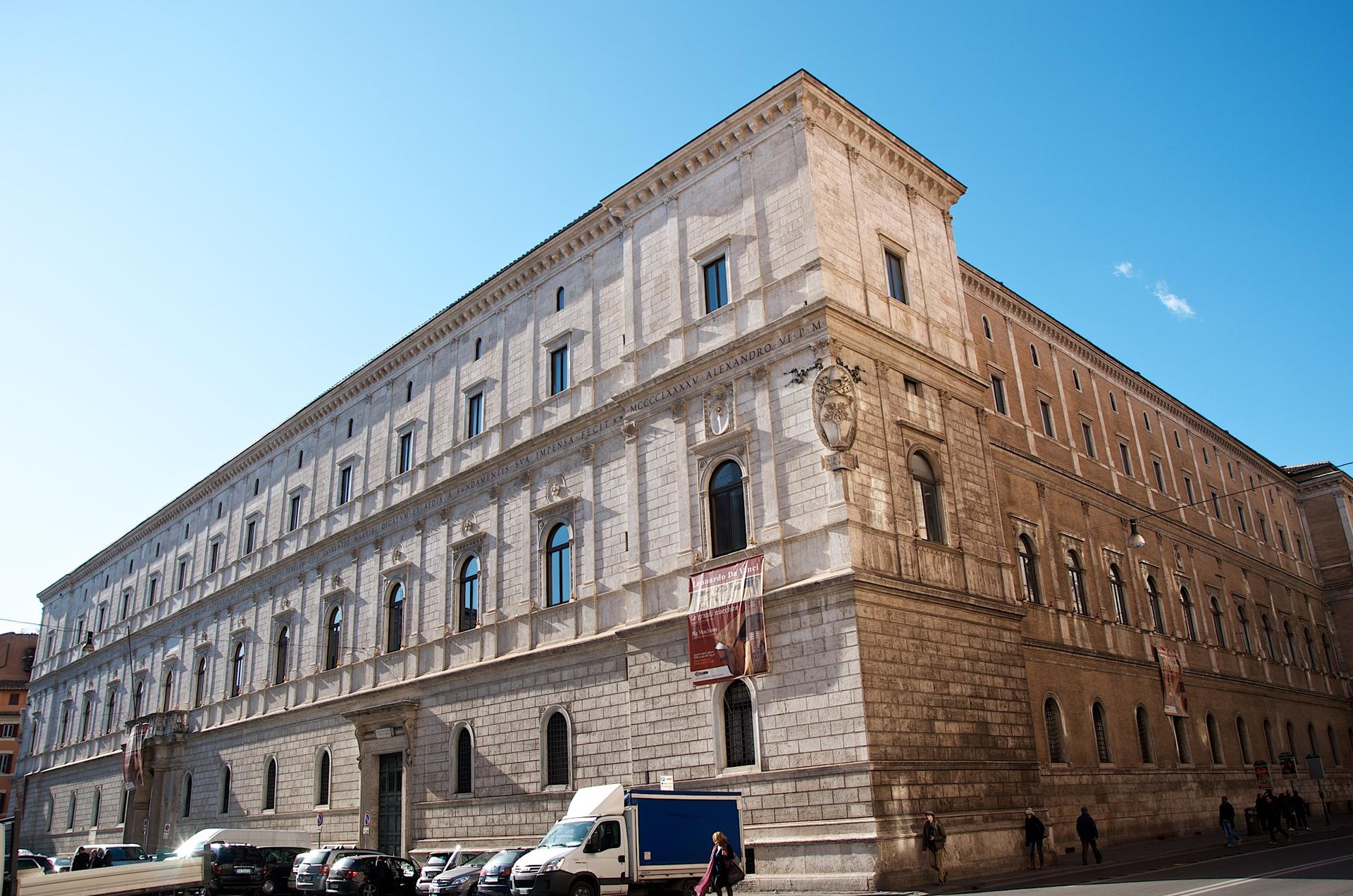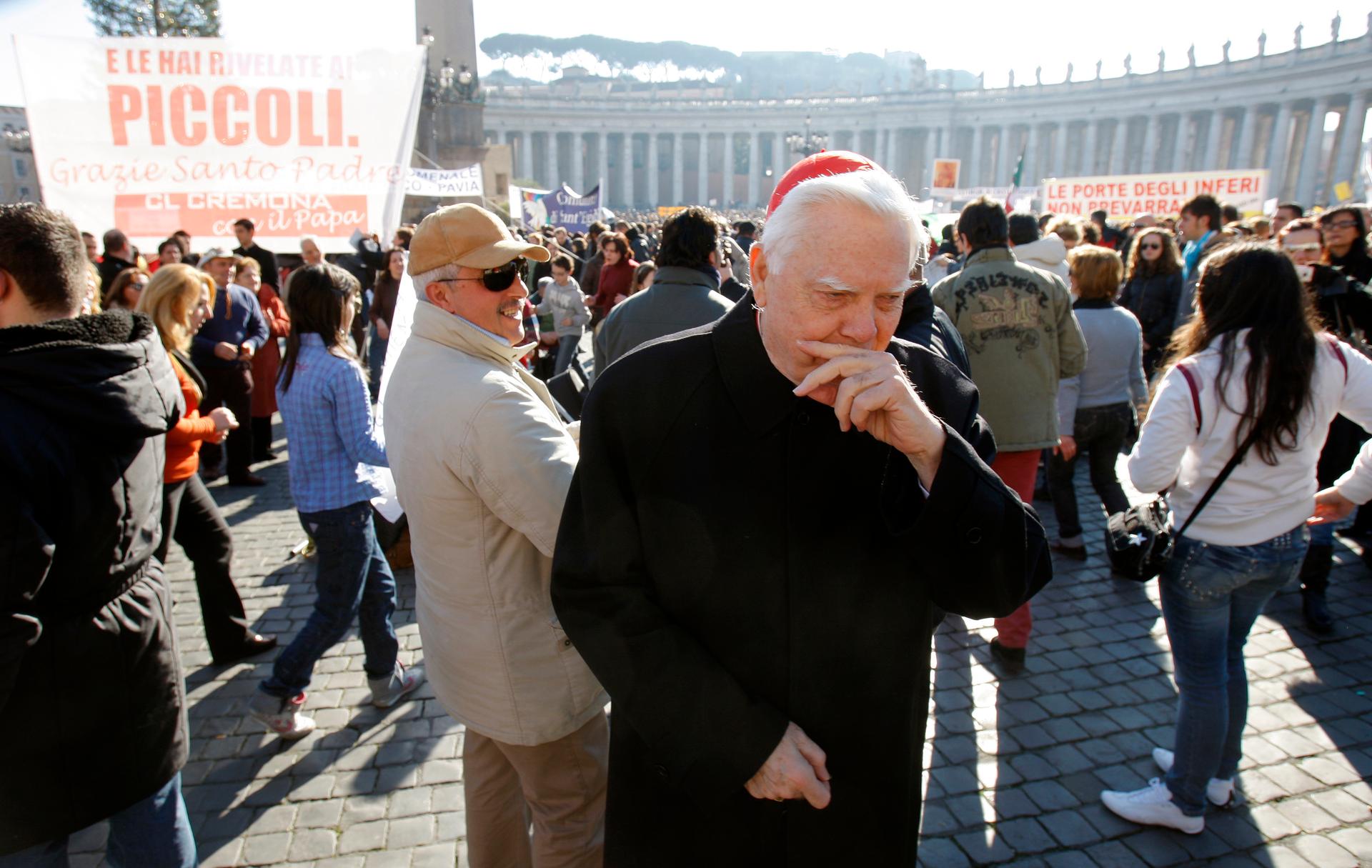The pope promises accountability to victims abused by the church. Where is Cardinal Law?
US Cardinal Bernard Law attends the weekly Angelus prayer by Pope Benedict XVI in 2008.
When Bernard Cardinal Law, Archibishop of Boston, fled to the Vatican in 2002, he left behind a trail of human and financial wreckage: 550 victims abused by parish priests and court judgments that eventually topped $85 million.
Meanwhile, Law was assigned a comfortable post in Rome, where he disappeared from the headlines.
Law led America’s fourth-largest archdiocese for 18 years. His reputation as a public figure peaked during Boston's court-ordered school desegregation crisis, when the cardinal emerged as a steadying voice of sanity. However, as his role as the architect of the abuse cover-up emerged, first in the Boston Phoenix, then in the Boston Globe, Law was transformed into a pariah. With permission from Pope John Paul II, he resigned in 2002 ahead of the mandatory age of 75. Law was subsequently appointed head of Santa Marie Maggiore, one of the most significant basilicas in Rome. He retired from that post in 2011.
But with Pope Francis promising victims of church sexual abuse on Sunday that all responsible will be held accountable, the question arises: Where is Cardinal Law now? What has he been doing since 2011?
Like many searches these days, this one begins with Google, in a café in Rome. I comb through recent articles, but none from 2015. And I come across an excerpt from Wikipedia that reads, "It was 'commonly believed that [Law would] live out his retirement in Rome' when he was retired in 2011. As of March 2013 he was still living at the Basilica di Santa Maria Maggiore." So that’s where I’m headed.
The temperature above ground is nearly 100 on this day and on a subway platform it’s only slightly cooler.
In front of the Santa Maria, several reporters covering the conference of mayors said that if you want to find Law, you have to come here.
I’m walking across the piazza and looking at a magnificently baroque edifice. This is one of the Rome's oldest basilicas, dating to the fifth century. Before traveling overseas, Pope Francis prays here, in what is popularly known as Our Lady of the Snows. Abuse victims saw this comfortable appointment as a reward, rather than a penance.
At the entrance to the basilica I ask a guard but I'm told Law's not here. So where is he? I walk into the massive domed church covered in fifth-century mosaics and find a nun who I hope can tell me where to find Law.
"Maybe if you go downstairs, there’s an archeological museum there," she replied.
But I wasn’t searching for the past. I was looking for the present — a man whose last four years in Rome have been a mystery to the people he left behind in Boston. So I turned to a priest walking by.
"He’s not here in this church, in this basilica, no," the priest said. "You have to ask the sacristy."
In the sacristy I found quiet, solitude and a visiting priest from the Philippines, but I did not find anyone who knew the whereabouts of Law. So I asked a basilica guide, who I was told would definitely know the answer to my question.
"St. Peter, not here," the guide said. "Alive in St. Pietro."
Alive in St. Peters — ah, of course, at the Vatican. So I'm headed there. I find a taxi and within minutes I'm crossing the vastness of St. Peter’s Square and have asked permission to see Bishop Sánchez Sorondo, a longtime friend of Law's.
"I invited Cardinal Law to an event that I organized through the Academy of Thomas Aquinas," Sorondo said. "And he explained very well the mission and the role of Thomas Aquinas and the church."
In contrast to Boston, Law is not controversial here. Sorondo heads up the Pontifical Academy of Social Sciences, which promotes the priorities of Pope Francis, which are seen as different from those of Law, who was closely aligned with conservatives, for example, on the role of women in the church. Law, according to an NBC report, strongly supported an investigation into the doings of a group of American nuns whose pronouncements on women’s rights were deemed out of step at the time. Now, it’s Law who’s out of step in a church that prioritizes climate change over abortion. As a retiree, Law played no role in choosing the new pope.
"He lives in a very nice building," Sorondo said of Law. "This is a famous building made by one of the more important architects of the renaissance time. The name is the [Palazzo della] Cancelleria. The Cancelleria is near here, it’s in the [Corso] Vittorio Emmanuele [II] and he lives in this new apartment in the Cancelleria. It's not in the center of the Vatican, but this part also belongs to the Vatican."

In his office, Sorondo and his assistant look though a Vatican telephone directory for the most recent telephone number and address for Law.
The telephone rings but no one answers, so I’m going to have to go to the Piazza Della Cancelleria, but must first get on the other side of the Vatican walls. I’m deep within the famous garden and a storm is on the way.
I need to get my passport back from Vatican security and then head into Rome.
On the other side of the wall you find yourself again in Rome. Law lives a few miles from here, but on Vatican property on the other side of the Tiber River. Walking in the rain, I have 25 minutes to go on foot and I’m heading left toward Via Paolo VI, turning right on Borgo Santo Spirito, and another right onto Ponte Vittorio Emmanuele II, past a street musician who seems undeterred by a steady rain. I continue onto Corso Vittorio Emmanuele II, and there it is, across the piazza: the Palazzo ella Cancelleria, or the Chancellery Palace, the exquisite new home of Cardinal Bernard Law.
I soon learn from a priest that Law, on this day, is doing what millions across Europe and the US do this time of year: He’s on vacation.
So we at least know where Law is living, here at the Chancellery — and we know he’s living well. Sorondo believes that Law is in relatively good health at age 84.
"I think so," Sorondo said confidently. "I think so."
But I did not get a chance to ask him what he would say now to the American people, to the people of Boston, to his friends in Boston and to the victims of the sex abuse scandal that plagued his diocese and plagued the church for so long — there are a plethora of questions still unanswered, and they may remain that way.
A version of this story first appeared on WGBHNews.org.
